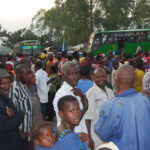The International Rescue Committee (IRC) is monitoring the situation in Uganda, where over 11,000 refugees from Eastern Democratic Republic of Congo (DRC) have arrived following ongoing fighting in the villages of Binja, Kinyarugwe and Chanzu.
Elijah Okeyo, IRC Uganda Country Director said, “There’s a fear of further escalation of conflict in the DRC and we are expecting more arrivals in the coming days. We are concerned about potential protection issues as the majority of those arriving over the border are women and children.”
Uganda has a long history and tradition of welcoming refugees from all over the world and is one of the world’s largest refugee hosting countries, with 1.5 million refugees mainly from South Sudan and the Democratic Republic of Congo.
“IRC is currently assessing the situation and looking into preparing a response for those arriving. The IRC calls for all parties in the DRC to commit to International Humanitarian Law including the protection of civilians,” he said.
The International Rescue Committee (IRC) in Uganda empowers post-conflict communities and refugees to recover in safety and build a productive, peaceful, and healthy future. By promoting high quality durable solutions that deliver on the interdependent aims of saving lives, strengthening institutions, and supporting social cohesion, the IRC is laying the building blocks for long-term stability and development, and is bringing people from harm to home.
The IRC began programming in 1998 in northern Uganda in response to mass displacement wrought by the Lord’s Resistance Army. Since then, the IRC has expanded to provide critical services for refugees and vulnerable Ugandans throughout the country.
The IRC started supporting refugees and vulnerable individuals in Kampala in 2012, and was one of the first organizations to respond in 2016 at the onset of the South Sudanese refugee crisis. As of 2019, the IRC entered Tooro to support refugees while also providing epidemic preparedness and response services throughout the region.
In addition to emergency support, the IRC also invests in long-term stability for refugees and Ugandans through programs like immunization, family planning, legal services, women’s empowerment, education, and livelihoods. More recently, IRC has been involved in supporting Afghan evacuees in Uganda.







